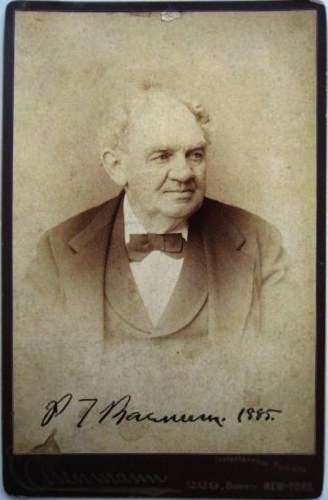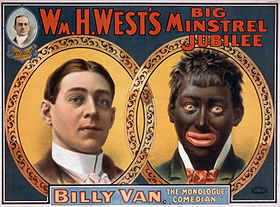
A poster celebrating that other “Greatest Showman on Earth” – circa 1882…
* * * *
Just a couple thoughts on the 2016 U.S. Presidential Race.
 First of all, if “The Donald” – shown at right in 1988 – does manage to get elected, he may well be the first president in American history to get both impeached and convicted.
First of all, if “The Donald” – shown at right in 1988 – does manage to get elected, he may well be the first president in American history to get both impeached and convicted.
And here’s a BTW: So far we’ve only had two presidents impeached – Andrew Johnson and Bill Clinton – but neither man ended up getting actually convicted by the U.S. Senate.
(And that statement about “impeached and convicted” is judging by the GOP’s late[st] push to stop Trump. “Which is being interpreted:” If Trump does turn out to be as bad as many people expect – on both sides of the aisle – it seems likely that Congressional Republicans would gladly join any Democratic effort to impeach and convict him, if only to secure their own future employment…)
The other observation: It wouldn’t surprise me a bit if Donald Trump is really trying to help Hillary get elected. In other words, it wouldn’t surprise me a bit to learn that Master Showman Donald Trump is actually playing those far-right conservatives like a piano.
Who knows? He may be trying to get some kind of political payback from Hillary. Or he may have felt it more advisable to run for president as a Republican rather than a Democrat. (How would “two New York Liberals” have played out at the Democratic convention?) Or maybe he just wants to shake things up, to “show that he can.” But whatever his true intentions, you can be sure he’s got something up his sleeve. (There’s “more here than meets the eye.”)
But we’re digressing. The title of this post refers to “that other ‘Teflon Don.'”
 The thing is, I originally planned to do a post comparing Donald Trump to P. T. Barnum – at left – known for an earlier Greatest Show on Earth. But surprisingly, I found a number of distinct differences between the two men. (One of them: Barnum turned out to be an effective elected official.)
The thing is, I originally planned to do a post comparing Donald Trump to P. T. Barnum – at left – known for an earlier Greatest Show on Earth. But surprisingly, I found a number of distinct differences between the two men. (One of them: Barnum turned out to be an effective elected official.)
But first, here’s something of an experiment. I Googled the phrase “donald trump fraud” and got 3,120,000 results. I Googled the phrase “donald trump hoax” and got 1,157,000 results. On the other hand, I Googled “donald trump huckster” and got a mere 32,400 results.
The point being that somewhere along the line, my recent free association on Donald Trump ultimately led me to that other Great American Showman, P. T. Barnum.
One surprising thing I learned about Barnum: He served 60 days in prison when he was 19 years old. He was publishing the weekly Herald of Freedom in Danbury, Connecticut. In the process he managed to upset “some very powerful people,” and got convicted of libel:
Traumatic though this spell in prison must have been … Barnum found that far from damaging his career the conviction increased both his notoriety and his popularity… He became a folk hero for some and upon his release from prison he was met by a band and a horse-drawn carriage organised by his supporters for a parade back to town.
Which might have led to Barnum being labeled “Teflon P.T.” However, that doesn’t have the same nice ring to it as “Teflon Don.” (And besides, Teflon hadn’t been discovered yet…)
Then too, in what might be called a similarity between the two men, Barnum (1810-1891) was known for an alleged comment, “There’s a sucker born every minute.”
But that seems to be like many another American myth, to wit: “greatly exaggerated:”
“There’s a sucker born every minute” is a phrase most likely spoken by David Hannum, in criticism of both P. T. Barnum, an American showman of the mid 19th century, and his customers. The phrase is often credited to Barnum himself. It means “People are foolish, and will always be fools.”
Wikipedia went on to indicate that we simply don’t know who first coined the phrase. (But it did add that in the “1930 John Dos Passos novel The 42nd Parallel, the quotation is attributed to Mark Twain.”) On the other hand, his biographer said Barnum “was just not the type to disparage his patrons.” For that matter, Barnum thought his audiences should get their money’s worth:
Often referred to as the “Prince of Humbugs” [as shown at right] Barnum saw nothing wrong in entertainers or vendors using hype (or “humbug,” as he termed it) in promotional material, as long as the public was getting value for money. However, he was contemptuous of those who made money through fraudulent deceptions, especially the spiritualist mediums [of] his day…
Now, about his serving as an “effective elected official.”
First of all, Barnum started out by promoting “hoaxes and human curiosities such as the Feejee mermaid and General Tom Thumb.” But that didn’t pan out, and after “economic reversals due to bad investments in the 1850s, and years of litigation and public humiliation, he used a lecture tour, mostly as a temperance speaker, to emerge from debt.” (Is is possible that, “The Donald” is also just trying to work himself out of debt?) The point is that from there:
Barnum served two terms in the Connecticut legislature in 1865 as a Republican. [On the issue of slavery] and African-American suffrage, Barnum spoke before the legislature and said, “A human soul, ‘that God has created and Christ died for,’ is not to be trifled with. It may tenant the body of a Chinaman, a Turk, an Arab or a Hottentot – it is still an immortal spirit.”
Which no doubt surprised a number of people.
From there he was elected as Mayor of Bridgeport, CT in 1875. He “worked to improve the water supply, bring gas lighting to streets, and enforce liquor and prostitution laws. Barnum was instrumental in starting Bridgeport Hospital, founded in 1878, and was its first president.”
Which no doubt surprised even more peope.
 In another strange twist, before the Civil War Barnum produced blackface minstrel shows, but with a twist: His “minstrel shows often used double-edged humor.”
In another strange twist, before the Civil War Barnum produced blackface minstrel shows, but with a twist: His “minstrel shows often used double-edged humor.”
Then too, in 1853 he promoted a “politically watered-down stage version of Harriet Beecher Stowe‘s Uncle Tom’s Cabin.”
But in Barnum’s version, the play, had “a happy ending, with Tom and other slaves freed.” And finally, another similarity: Both men started out as Democrats. In Barnum’s case, his “opposition to the Kansas-Nebraska Act which supported slavery, of 1854 led him to leave the Democratic Party.”
And so, in joining the “new anti slavery Republican Party,” Barnum had “evolved from a man of common stereotypes of the 1840s to a leader for emancipation by the Civil War.”
The question is: In light of Donald Trump’s often-shifting political positions, will he eventually be seen as an “effective elected official,” a funhouse showman, or a Simon Legree?

Simon Legree hunting fugitive slaves in “UTC.”
* * * *
The upper image is courtesy of the Jumbo link within P. T. Barnum – Wikipedia, the free encyclopedia. The caption: “Jumbo and his keeper Matthew Scott (Circus poster, ca. 1882).” For further information on Barnum, see P.T. Barnum, Human Freaks, and the American Museum, and/or P T Barnum Facts, information, pictures | Encyclopedia.com.
Re: To play someone like a piano. The cited reference is actually to playing someone like a fiddle – Wiktionary, meaning to ” manipulate (a person) skillfully.”
Re: Free association. See also Free association (psychology) – Wikipedia.
The lower image is courtesy of Wikipedia’s Uncle Tom’s Cabin.” The caption: “Simon Legree on the cover of the comic book adaptation of Uncle Tom’s Cabin (Classic Comics No. 15, November 1943 issue).” And a note on Barnum’s “happy ending.” In the original version Uncle Tom died, a victim of Simon Legree. In turn, he is portrayed as “the perfect Christian.” That is, at the end of the novel the character George Shelby returns to his Kentucky farm and frees all his slaves. In doing so he “tells them to remember Tom’s sacrifice and his belief in the true meaning of Christianity.”
Re: Trump’s political positions: “On specific policy, Trump has been described as a moderate Republican. His politics have been described as populist, nativist, protectionist and authoritarian by a variety of sources.” A few examples: Trump has said he wants to “lower taxes for middle and working-class people, and increase taxes on wealthy private equity and hedge fund managers.” He has supported “improving America’s infrastructure,” even though on the federal level – he has said – “this is going to be an expensive investment, no question about that.” He started out pro-choice but now describes himself as pro-life. He supports “states’ rights to legalize and regulate cannabis.”
One final note: The “Simon Legree” comparison is based in large part on Trump’s emphasis on Mexico sending “its people” into the U.S., mostly “criminals, drug dealers, rapists, etc.,” while “some, I assume, are good people.” He has said that on “Day 1 of my presidency, illegal immigrants are getting out and getting out fast,” and that he would build a wall similar to the Israeli West Bank barrier. Finally, “Trump opposes birthright citizenship based solely on birth within the United States, arguing that it should not be protected by the Fourteenth Amendment.”